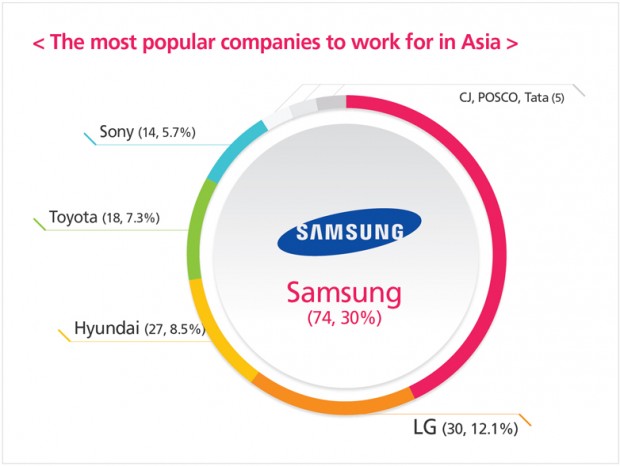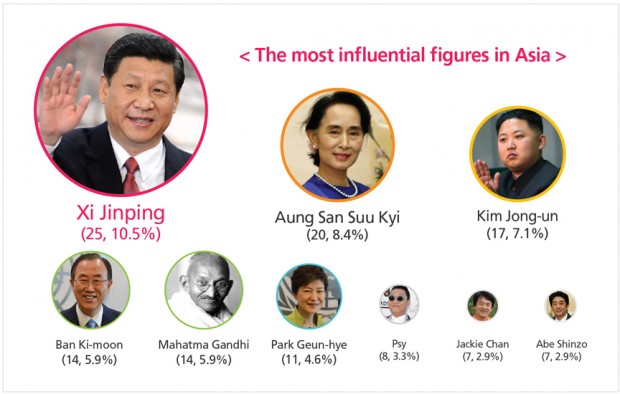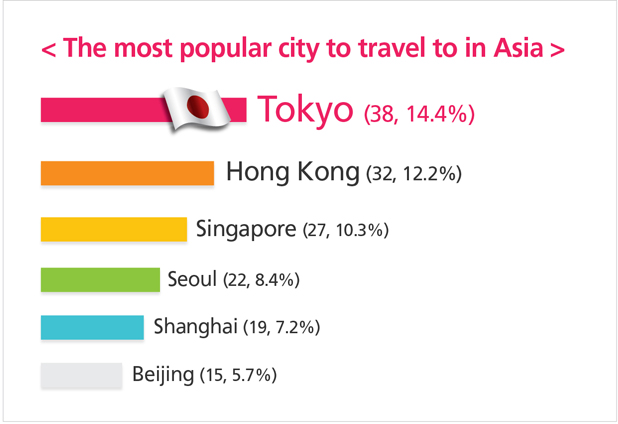Samsung chosen as most popular company to work for in Asia
Survey commemorating the launching of ‘Magazine N’
“I want to work at Samsung, and visit Tokyo,” Asian university students say. They have also chosen Xi Jinping as the most influential individual in Asia. The students were asked three questions and Korea, China, and Japan each ranked first in one category.
Which Asian companies do many Asian university students want to work for? The Asia Journalist Association(AJA) and The AsiaN conducted a survey of 101 university students from all over Asia. The survey results overwhelmingly showed ‘Samsung’ to be the most preferred company, selected by 74 people (excluding the 20% who answered ‘don’t know’ or gave no response).
The survey asked three free response questions: “Which Asian global corporations do you want to work for most?”, “Who do you think the most influential people in Asia are?” and “Which Asian cities do you want to visit most?” They were asked to give three answers for each question. Respondents chose Xi Jinping(25 people, 10.5%), President of China, as the most influential person in Asia and Tokyo(38 people, 14.4%) as the city in Asia they want to visit most. Consequently, Korea•China•Japan each took first place for one question.
The survey was conducted both online(overseas) and offline(in Korea) last May through an online Google survey and an offline survey form conducted near universities. Nationalities of university students include Chinese, Indonesian (13 people each), Indian(9 people), Bangladeshi, Myanmarese (8 people each), Nepalese, Bruneian (7 people each), Korean (6 people), Japanese, Malaysian, Filipino(4 people each), Laotian, Vietnamese(3 people each), Azerbaijani, Cambodian, Iranian, Pakistani, Uzbek (2 people each), Thai, and Egyptian (1 person each).
Asian university students chose LG(30 people, 12.1%) and Hyundai(21 people, 8.5%) next to Samsung, making Korean corporations account for more than half of the responses. These corporations were followed by Japanese ones such as Toyota(18 people, 7.3%), and Sony(14 people, 5.7%). 5 respondents each selected CJ, POSCO, Tata(Indian corporation) and there were 4 people who selected Honda, Lotte and Reliance(Indian chemical corporation).
Three people chose KOICA and Lenovo(Chinese PC company) respectively, and 2 people chose Petronas(Malaysian Petroleum company), Haier(Chinese household electrical appliances company), HSBC, JAL, Korean Air, Petro China(Chinese Petroleum), SINOPEC GROUP(Chinese Petroleum Chemical Engineering group), TOSHIBA, UNIQLO as Asian companies where they would like to work. Respondents tended to favor internationally well-known multinational companies and airlines. After Korean and Japanese companies, companies from these countries were favored in the following order: China(6.1%), India(4.9%), Malaysia(1.2%), Singapore(1.2%), and Indonesia(0.8%).
When asked who the most influential individual in Asia was, after Xi Jinping they chose Aung San Suu Kyi(20 people, 8.4%), Kim Jong-un(17 people, 7.1%), Ban Ki-moon, Mahatma Gandhi(14 people each, 5.9%), Park Geun-hye(11 people, 4.6%), Abe Shinjo(7 people, 2.9%). In addition, there were also celebrities like Psy(8 people, 3.3%) and Jackie Chan(Sung-ryong, 7 people, 2.9%) among the responses, which showed the power of culture. Dalai Lama, Mahathir Mohammad(Former Prime Minister of Malaysia)(6 people each), Muhammed Yunus(Nobel Prize Laureate from Bangladesh), Lee Kuan Yew(Former Prime Minister of Singapore) (4 people), Confucius, Kim Yu-na, Mahmoud Ahmadinejad(President of Iran), Manmohan Singh(Prime Minister of India), Sukarno(first President of Indonesia), Hassanal Bolkiah(Sultan of Brunei) were also chosen as Asians with great influence. Korean(20.8%) and Chinese(20.1) nationalities accounted for the majority of responses and Indian(11.3%), Myanmarese(8.8%), North Korean(7.5%), Japanese and Indonesian(5.4% each) ones followed.
As for the city in Asia that they want to visit most, Tokyo was selected as an attractive tourist spot even after the great Japanese earthquake. After Tokyo, Hong Kong(32 people, 12.2%), Singapore(27 people, 10.3%), Seoul(22 people, 8.4%), Shanghai(19 people, 7.2%) and Beijing(15 people, 5.7%), Bangkok(13 people, 4.9%), New Delhi(9 people, 3.4%), Kuala Lumpur(8 people, 3%), Dubai(5 people, 1.9%), Kathmandu, Osaka(4 people each), Pyongyang, Abu Dhabi, Busan, and Mecca(3 people each) were selected. Chinese cities(26.2%) ranked the highest followed by Japanese (17.9%), Korean, Singaporean(10.3% each), Indian, and Thai cities(5.3% each).

























































